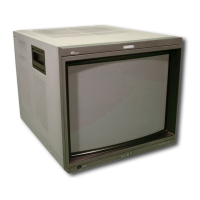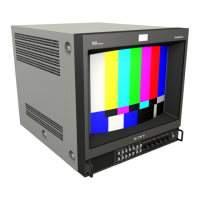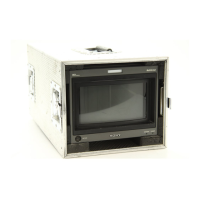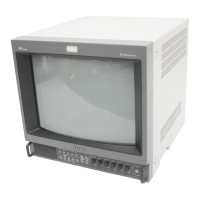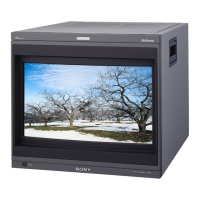Do you have a question about the Sony TRINITRON BVM-20F1U and is the answer not in the manual?
Covers fire/shock hazards, exposure to rain/moisture, and opening the cabinet.
Warns of explosion hazard if battery is replaced incorrectly and advises on disposal.
Advises that the socket-outlet should be near the equipment and easily accessible.
Specifies UL LISTED power cord use and FCC rules for USA customers.
Mandates earthing the apparatus and provides wiring color code information.
Information regarding the built-in battery, its replacement, and disposal.
Confirms compliance with EMC Directive (89/336/EEC) and Low Voltage Directive (73/23/EEC).
Details conformity to EN60950, EN55103-1, and EN55103-2 standards.
Specifies environments (E1, E2, E3, E4) for which the product is designed.
Covers unit operation, power cord handling, and socket-outlet installation.
Guidance on air circulation, avoiding heat sources, and proper placement.
Instructions for cleaning the unit with mild detergent and avoiding solvents.
Details on avoiding magnetic interference and potential picture distortions.
Advice on cleaning the CRT screen and managing static electricity.
Introduction to BVM series color video monitors and their applications.
Details on the HR Trinitron picture tube, aperture grille pitch, and resolution.
Information on separate control units and controlling multiple monitors in groups.
Features like memory card setup, auto alignment, and expandable input connectors.
Discussion on 4:3/16:9 aspect ratio and stable color temperature.
Blue-only mode for adjustments and overview of menu operation.
ISR system, remote control, test signals, VITC, and Caption Vision capabilities.
Monitor control units (BKM-10R/11R) and memory card (BKM-12Y).
16:9 masks for screen display and rack mount kits for installation.
Configuring the input connector panel with optional adaptors.
Details on BKM-20D, BKM-21D, BKM-22X, BKM-24N, BKM-25P, BKM-26M, BKM-27T adaptors.
Information on BKM-28X and BKM-48X adaptors for expanding inputs.
Assembling the panel with adaptors and setting signal types.
Table showing signals supported by various adaptors.
Compatibility and signal format selection guidelines for adaptors.
Determining which adaptor is selected when multiple NTSC/PAL adaptors are installed.
Correct installation order and the importance of the radiation shield.
Diagram and labels for the front panel of 14-inch models.
Diagram and labels for the front panel of 20-inch and other 14-inch models.
Functionality of the tally lamp and power switch, including remote control aspects.
CRT degaussing, inputting values, and using manual adjustment knobs.
Important notes regarding composite SECAM, PAL D, component, and SDI signal formats.
Functions of the MENU, UP/DOWN, ENTER, and PHASE buttons.
Meaning of the POWER, STANDBY, and OVER LOAD indicator lamps.
How the SHIFT button controls function button LEDs and selects function sets.
Functions like Underscan, H/V Delay, MONO, APT, COMB, F1-F2, ADDRESS.
Functions available when SHIFT is ON, detailed on the next page.
16:9 aspect ratio toggle and SYNC signal selection (INT/EXT).
BLUE ONLY mode, R/G/B cutting, and SAFE AREA display.
Procedures for inserting and ejecting the memory card, with cautions.
Connecting external control units (BKM-11R) and probes (BKM-14L).
Diagram showing all rear panel connectors and switches.
AC IN connector, MAIN POWER switch, and CONTROL UNIT connector.
Fuse, Deflection option slot, REMOTE 1, REMOTE 2, and ISR connectors.
BNC connectors for Y/G, B-Y/B, R-Y/R, SYNC signals, loop-through outputs.
Number of adaptors that can be installed per monitor model.
RS-485 serial interface for connecting multiple monitors with loop-through.
Detailed pin functions for parallel remote control and customization options.
Connection for the Interactive Status Reporting system.
Description of front panel buttons used for menu navigation.
Step-by-step guide on how to access and move through menus.
Repeating steps, understanding menu continuation, and selecting items.
How to choose from lists and input numerical data.
Steps for entering text for channel names or other settings, including correction.
Purpose of setting preset values for contrast, brightness, chroma, and phase.
Hierarchical diagram of the CONTROL PRESET ADJ menu.
Descriptions of PRESET/CH SET, MANUAL, AUTO, and COPY sub-menus.
Using knobs, erasing characters, and resetting values.
Procedure for automatic adjustment using color bar signals.
Copying settings from other channels, monitors, or memory cards.
Purpose of adjusting color temperature and available methods.
List of compatible probes (SONY, MINOLTA, GRASEBY, PHILIPS, THOMA).
Visual representation of the menu structure and levels.
Selecting STD, COL1, COL2, or CH SET for color temperature.
Choosing between MANUAL, PROBE, COPY, and TRIM adjustments.
Adjusting RED, GREEN, BLUE, and LUMINANCE gain/bias.
Erasing characters and resetting manual adjustment values.
Selecting color signals and notes on SYNC button usage.
Choosing data sources for copying: other value, monitor, or memory card.
Detailed explanation of gain/bias adjustment and reset options.
Setting original values, STD/COL1/COL2, and signal types for adjustment.
Selecting the appropriate probe for adjustment.
Performing ADJUST and ANALYZE functions with the BKM-14L.
Starting automatic adjustment using D65/D93 and light levels.
Displaying color temperature and luminance values.
Menus for other probes and copying color temperature data.
Copying data from other value, monitor, or memory card.
Using the TRIM menu for fine adjustments to gain and bias.
Setting input signals, connectors, and channel assignments.
Mapping input connectors to specific slots and channels.
Setting signal types like digital, composite, Y/C, component, and RGB.
Selecting AUTO, NTSC, PAL, or SECAM formats for composite/Y/C signals.
Configuring YUV, RGB, and Serial Digital (SDI) signal formats.
Selecting Y/C filters and screen modes (scan size, aspect ratio).
Setting safe area size and assigning names to channels.
Selecting STD, COL1, COL2, or CH SET for color temperature.
Copying settings from other channels, monitors, or memory cards.
Detailed settings for FORMAT, SLOT NO, INPUT NO, YC SEP, SYNC MODE, etc.
Settings for FILTER, CHANNEL NAME, CONTROL, COLOR TEMP, H PHASE, COPY.
Purpose of password protection for menu settings.
How passwords are displayed and applied to menu items.
Hierarchical structure of the password settings.
Procedure for setting and confirming a new four-digit password.
Selecting which menu items to protect with a password.
Settings for channel entry, power-up conditions, degauss delay, and AFC.
Hierarchical structure of the system configuration settings.
Methods for channel entry and power-up conditions (Standby/Operation mode).
Setting degauss delay time and AFC time constant.
ACC switch, Contrast/Brightness Hold, and COLOR TEMP shortcut.
Selecting types of information to display on the screen.
Hierarchical structure for on-screen display settings.
Displaying VITC, Caption Vision, Channel Number, and Channel Name.
Displaying ancillary data and selecting positions for on-screen elements.
Purpose of adjusting screen convergence and geometry.
Hierarchical structure for convergence and geometry adjustments.
Adjusting ROTATION, H PHASE, V CENTER, H SIZE, V SIZE, LINEARITY.
Correcting H PIN, H PIN BAL, H KEY, H LIN distortions.
Adjusting vertical and horizontal convergence at different screen areas.
Functions: factory data restore, memory card ops, monitor restart, white balance.
Hierarchical structure for accessing extended functions.
Entering password and reloading factory default data for installed boards.
Using memory card for backup/restore and restarting the monitor.
Adjusting SETUP and 100 IRE levels of internal white signal.
Procedure for reading system data from the monitor memory card.
Restarting the monitor and adjusting internal white signal levels.
Performing operations on data stored in the monitor memory card.
Hierarchical structure for memory card operations.
Detailed functions for managing data on the memory card.
Sharing data between monitors connected via serial remote ports.
Hierarchical structure for monitor-to-monitor data copying.
Copying all settings, or specific settings like CONTROL PRESET, COLOR TEMP, SET UP.
Viewing general monitor data and signal assignments.
Hierarchical structure for accessing status information.
Displaying channel status, model name, operation time, and slot status.
Choosing which monitor or group to control remotely.
Procedure for displaying the ADDRESS menu on screen.
Important notes on group mode, SINGLE mode, and LED indicators during remote control.
How to cancel active remote control operations.
Methods for closing the ADDRESS menu.
Quickly selecting monitors in SINGLE, GROUP, or ALL modes.
Details on video system, lines, fields, and interlacing.
Information on Trinitron CRT, protection type, and anode voltage.
Nominal chromaticity coordinates for SMPTE and EBU phosphors.
Voltage range, power consumption, and impact of optional adaptors.
Inrush current values measured by different methods and standards.
Physical size and mass for all BVM monitor models.
Visual representation of the physical layout of monitor rear panels.
Details on BNC, Mini-DIN, D-sub connectors and their signal capabilities.
Pin assignments and interface details for REMOTE 2 and ISR connectors.
Specifications for differential gain/phase, frequency response, DC restoration, and black level.
AFC time constant, line pull, blanking times, scan, linearity, and resolution.
Recommended temperature, humidity, and pressure for operation and storage.
List of items included with the monitor package.
Information regarding the need for special cables to connect probes.
Specifications and pin assignments for the Graseby SLS 9400 probe connection cable.
Specifications and pin assignments for the Minolta CA-100 probe cable.
Specifications and pin assignments for the Philips PM 5639 probe cable.
Specifications and pin assignments for the Thoma TF6 probe cable.
Specifications for convergence error within central and outer picture areas.
Brightness level and stability of raster size.
Scan delay timing and monitor resolution (TV lines).

